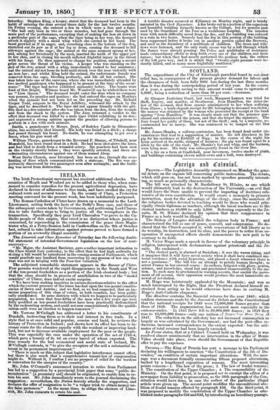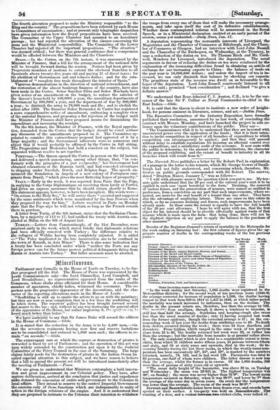futtigu nut( eniniaL- FRANcE.—The Legislative Assembly commenced on Monday the
gene- ral debate on the organic bill concerning public instruction. The debate, which still goes on, has not been marked by speeches generally interest- ing, so much as personally characteristic.
The bill was attacked by M. Barthelemy St Hilaire, as one which would ultimately lead to the destruction of the University,—an evil that would leave the State unable to prevent the imparting of doctrines sub- versive of its own constitution. It would create a monopoly in primary, instruction, most for the advantage of the clergy, since the members of the religious bodies devoted to teaching would be those who would prin- cipally obtain diplomas as teachers, although the laical teachers are to the clerical teachers as 40,000 to only 3,000. Referring expressly to the Je- - suits, M. St. Hilaire declared his opinion that their reappearance- in. France as a body would be illegal.:
The Bishop of Langres defended the religious body in France ; and characterized the bill as one of peace, concord, and compromise. He de- clared that the Church accepted it, with reservations of full liberty as to., its worship, its instruction, and its alms, and the power to retire from co- operation if unexpected effects should demonstrate the new path to be contrary to its faith.
M. Victor Hugo made a speech in favour of the voluntary principle in religion, interspersed with declamations against priestcraft and the Je- suits. He exclaimed— "The clerical party is alarmed at Socialism ; it sees the waves rifling; and' it imagines that it will have saved society when it shall have combined ma- - terial resistance with social hypocrisy, and placed a Jesuit wherever there is not a gendarme." The bill was an attempt to petrify human thought to arrest France in her onward course : its authors, fatigued with glory, genius, science, and knowledge, stood fast and proclaimed immoveability to the na- tion. To such men he proclaimed in warning accents, that amidst the move- ment of all around, their opposition would produce the most lamentable re- newal of revolution.
M. Hugo was boisterously applauded by the Mountain ; and was so much interrupted by the Right, that the President declared himself re- strained from acting as he would otherwise have done in curbing M. Hugo's Anti-Catholic eloquence.
The Moniteur contains the financial returns for the year 1849 ; which confirm statements made by the Journal des Davits and the Constitutionnel that the national receipts for 1849 were 72,000,000 francs greater than those of 1848. The augmentation has occurred most especially in the custorms-iimies.-- - In 1848 44-reae fell to 59,000,000 fans; in 1849 they rose to 83,000,000 francs—only one million of franrt:r^ia than f_br.r.o of 1847. The reduction on the salt-duty has not increased consumption so largely as was calculated by the Government ; nor had the post-oMee re- ductions increased correspondence to the extent expected : but the esti- mates of total revenue had been largely exceeded. La Presse states, that at a Cabinet Council held on Wednesday, it was resolved almost unanimously that no intervention in the affair of Monte Video should take place, even should the Government of that Republic offer to pay the expenses.
Paussra.—The King of Prussia has sent a message to his Parliament declaring his willingness to sanction "the Constitution of the 5th of De- cember," on condition of certain important alterations. With the mes- sage was a document formally enumerating fifteen proposed alterations, backed by a lengthened exposition of reasons. The moat interesting points concern-1. The law of the press; 2. The law of feudal tenures; 3. The constitution of the Upper Chamber • 4. The responsibility of the Ministry. On the first point, it is proposed not to exempt the editor of a newspaper from liability to prosecution, as the 26th paragraph of the Con- stitution would have done, in case the author of the particular illegal article were given up. The second point modifies the unconditional abo- lition of feudal tenures effected by paragraph 42d. On the third point, it was proposed to modify the constitution of the Upper Chamber as esta- blished under paragraphs62d and 63d, by introducing an hereditary peerage.
The fourth alteration proposed to make the Ministry responsible " to the King and the country." The propositions have been referred by each House to Committees of examination ; and at present only telegraphic despatches have given information how the Royal propositions have been received. The Committee of the Upper Chamber had assented to an hereditary peerage ; but had rejected the alteration of the clauses concerning the and the Ministerial responsibility. The Committee of the Lower
ber had rejected all the important propositions. "The situation" was deemed critical ; but there was general confidence that a compromise would be effected between the Ministers and the Chambers.
Srans.—In the Cortes, on the 7th instant, it was announced by the Minister of Finance, that a bill for the arrangement of the,national debt will be brought forward during the session. Notices had been given by Progresista members of motions to extend the electoral franchise to all Spaniards above twenty-five years old and paying 21. of direct taxes ; for the abolition Of Government salt and tobacco duties ; and for the esta- blishment of " complete free trade throughout the interior of Spain." Vigorous demonstrations in the direction of national retrenchment, and the restoration of the almost bankrupt finances of the country, have also been made in the Cortes. Sam. Sanchez •Silva and Seiler Muchada have given notice of an amendment on the budget, to reduce the salaries of the Queen's household by 100,0001. a year, the annilitary departments of government by 500,000/. a year, and the department of war by 500,0001. a year; to diminish the army to 70,000 rank and file ; and to abolish the octroi after 1850. The financier Senor Bermudez de Castro has registered -a more comprehensive notice of amendment, embracing a complete view of the national finances, and proposing a flat rejection of the budget until the Minister of Finance aball have proposed means for diminishing the expenditure and increasing the receipts. On the 8th instant, the Minister of Finance, with the Royal approba- tion, demanded from the Cortes that the budget should be voted without any discussion of the amendments proposed on it. The Committee ap- pointed to consider this extraordinary proposal had approved of it by a large majority ; and the Government adherents were so numerous and abject that it would probably be affirmed by the Cortes in full sitting. The Progresistas and Moderates had held a conclave on the subject, but separated without resolve to act together.
Penreosi..—The Queen opened the Cortes in person on the 2d instant, and delivered a speech announcing, among other things, that, "in con- formity with the principles of a just reciprocity," her Government had obtained relaxations of the Russian tariff, and had conceded advantages to shipping under Swedish, Dutch, and Belgian flags. The speech an- nounced the foundation in Angola of a now colony of Portuguese emi- =grants from Brazil, "which gives the most flattering hopes of prosperity."
Irm.r.—Early in the week, it was reported from Paris that the Pope, in replying to the Corps Diplomatique on receiving them lately at Portici, had given an express assurance that he should return shortly to Rome. His statement appears, however, to have been inexplicit. His words were- " On return to the Holy See," he will arrive there escorted and supported tithe same sentiments which were manifested by the four Powers when they prepared the way for him." Letters received in Paris on Monday
• state that the Pope says ho will not return so long as the French remain there in garrison.
A letter train Turin, of the 9th instant, states that the Sardinian Cham- bers, by a majority of 112 to 17, had ratified the treaty with Austria con- cluded at Milan on the 6th of August last.
TURKEY.—Letters from Constantinople, of the 31st December, were received early in the week, which stated briefly that diplomatic relations had been officially renewed with Turkey ; the difference relative to the refugees of Widdin having been completely adjusted. It is added —" The Poles implicated in the late insurrection are to be confined in the town of Koniah, in Asia Minor." There is also some indication that a treaty has been concluded under which "neither the Porte nor any foreign power can for the future protect political delinquents flying from Russia or Austria into Turkey." But fuller accounts must be awaited.



























 Previous page
Previous page